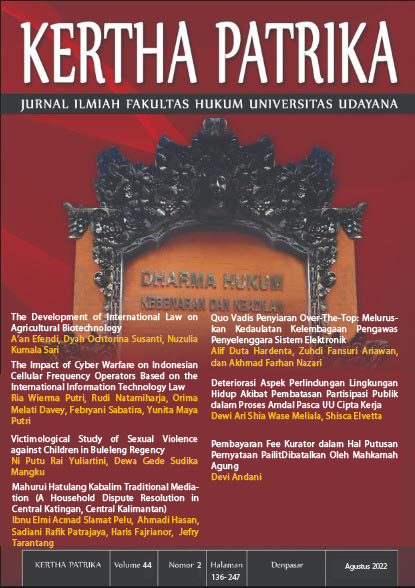Quo Vadis Penyiaran Over-The-Top: Meluruskan Kedaulatan Kelembagaan Pengawas Penyelenggara Sistem Elektronik
Abstract
Over-The-Top (OTT) media-based Electronic System Operators are increasingly being used by the public as a result of media convergences and internet services. Nevertheless, the use of OTT services raises various problems, ranging from problems of threats to users, to regulatory issues for OTT. So far, OTT services are not regulated in a standard manner in one comprehensive law, causing uncertainty for both the consumer and its competitors, which are arranged by some regulatory attestation. This problem then became tangible when one of the broadcast services tried to appeal related to the definition and scope of regulation from the OTT services to the Constitutional Court. Based on these complications, it can be stated that there is a need for legal arrangements followed by institutions from the OTT supervisor. Therefore, the researcher elaborates the status quo with the problems of implementing the OTT services. With the description of the problem, together with further comparisons between countries, the researcher can conclude the arrangements for OTT organizers that can be included in legal regulations. In this study, several policy strategies were formulated for the implementation of institutional arrangements in the OTT services.
Downloads
References
Hamdi, A.S. (2014). Metode Penelitian Kuantitatif: Aplikasi dalam Pendidikan. Yogyakarta: Penerbit Deepublish.
Ibrahim, J. (2006). Teori dan Metodologi Penelitian Hukum Normatif. Malang: Bayumedia Publishing.
Katsh, M.E. (1989). The Electronic Media and The Transformation of Law. New York: Oxford University Press.
B. Makalah/Artikel/Prosiding/Hasil Penelitian
Afiftania, L.A. et. al. (2021). Diferensiasi Hukum bagi Penyedia Layanan Over The Top (Studi Perbandingan Indonesia dengan Singapura). Perspektif Hukum. 85-88. DOI: DOI:10.30649/PHJ.V21I1.299.
Agatha, A.R., Hadjon, E.T.L. (2020). Urgensi Pengawasan Layanan Konten Digital Over The Top (OTT) di Indonesia, Jurnal Kertha Negara. 8 (12). 24-39. Retrieved from https://ojs.unud.ac.id/index.php/Kerthanegara/article/view/64830.
Ernawati. (2020). Pembatasan Konten Digital Pada Media Netflix Oleh Komisi Penyiaran Indonesia. Jurnal Perspektif: Kajian Hukum. 25 (1). 50-53. DOI: http://dx.doi.org/10.30742/perspektif.v25i1. p. 51-52.
Huda, N. (2017). Potensi Sengketa Kewenangan Lembaga Negara dan Penyelesaiannya di Mahkamah Konstitusi. Jurnal Hukum Ius Quia Iustum. 24 (2): 1-4. DOI: https://doi.org/10.20885/iustum.vol24.iss2.art2.
Muhlizi, A.F. (2017). Penataan Regulasi Dalam Mendukung Pembangunan Ekonomi Nasional. Jurnal Rechtsvinding. 6 (3): 356-360. DOI: http://dx.doi.org/10.33331/rechtsvinding.v6i3.191.
Risdianto, D. (2017). Kebijakan Dan Strategi Pembangunan Hukum Dalam Memperkuat Ketahanan Nasional. Jurnal Penelitian Hukum De Jure. 17(2): 180-183. DOI: http://dx.doi.org/10.30641/dejure.2017.V17.177-193.
Valentine, L. Z. (2018). Analisis Perspektif Regulasi Over the Top di Indonesia Dengan Pendekatan Regulatory Impact Analysis. Jurnal Telekomunikasi dan Komputer. 8 (3): 222-232. DOI: 10.22441/incomtech.
C. Internet
Asosiasi Penyelenggara Jasa Internet Indonesia. Laporan Survei Internet APJII 2019-2020 (Q2). Available from https://apjii.or.id/survei2019x/download/bZHWtLMinDremwSyvdkYscBX3aqFl0, diakses 8 April 2021.
CNN Indonesia. LSF Minta Payung Hukum untuk Sensor Film Netflix dan Iflix. Available from https://www.cnnindonesia.com/hiburan/20200220190418-220-476564/lsf-minta-payung-hukum-untuk-sensor-film-netflix-dan-iflix, diakses 29 April 2021.
Republika. Tokopedia Laporkan Kasus Kebocoran Data Pengguna. Available from https://www.republika.co.id/berita/qd18a0414/tokopedia-laporkan-kasus-kebocoran-data-pengguna, diakses 9 April 2021.
Kementerian Komunikasi dan Informatika Republik Indonesia. Trust + Positif. Available from https://kominfo.go.id/content/detail/332/trustpositif/0/e_ business, diakses 16 April 2021.
Media Indonesia. Layanan OTT Berbeda dengan Penyiaran Publik. Available from https://mediaindonesia.com/politik-dan-hukum/339796/layanan-ott-berbeda-dengan-penyiaran-publik, diakses pada 20 April 2021.
Tempo. Ini Alasan KPI Ngotot Awasi Tayangan Youtube hingga Netflix. Available from https://bisnis.tempo.co/read/1234392/ini-alasan-kpi-ngotot-awasi-tayangan-youtube-hingga-netflix, diakses 17 April 2021.
The Trade Desk. 57 Percent of Southeast Asian Viewers are Now Streaming More OTT Video Content Because of COVID-19. Available from https://www.businesswire.com/news/home/20201207006003/en/, (diakses 8 April 2021).
Yozami. KPI Ingin Awasi Konten Digital, Kominfo: Belum Ada Aturannya. Available from https://www.hukumonline.com/berita/baca/lt5d5260a5e791a/kpi-ingin-awasi-konten-digital--kominfo--belum-ada-aturannya, diakses 17 April 2021.
D. Peraturan Perundang-Undangan
Undang-Undang Nomor 11 Tahun 2008 tentang Informasi dan Transaksi Elektronik.
Undang-Undang Nomor 32 Tahun 2002 tentang Penyiaran.
Undang-Undang Nomor 33 Tahun 2009 tentang Perfilman.
Undang-Undang Nomor 21 Tahun 2011 tentang Otoritas Jasa Keuangan
Peraturan Pemerintah Nomor 18 Tahun 2004 tentang Lembaga Sensor Film.
Peraturan Pemerintah Nomor 71 Tahun 2019 tentang Penyelenggaraan Sistem dan Transaksi Elektronik.
Peraturan Menteri Komunikasi dan Informatika Republik Indonesia Nomor 5 Tahun 2020 tentang Penyelenggara Sistem Elektronik Lingkup Privat.
Peraturan Otoritas Jasa Keuangan RI Nomor NOMOR 1/POJK.07/2014 Tentang Lembaga Alternatif Penyelesaian Sengketa Di Sektor Jasa Keuangan.
Surat Edaran Menteri Komunikasi dan Informatika Nomor 3 Tahun 2016 tentang Penyediaan Layanan Aplikasi dan/atau Konten Melalui Internet (Over The Top).
Putusan Mahkamah Konstitusi Nomor 39/PUU-XVIII/2020 perihal Pengujian Undang-Undang Nomor 32 Tahun 2002 tentang Penyiaran terhadap Undang-Undang Dasar Negara Republik Indonesia Tahun 1945.
Telecommunication Regulation of the People’s Republic of China (2016 Revision).
The Law of Turkish No.6112 on the Establishment of Radio and Television Enterprises and Their Media Services.
Singapore Info-Communications Media Development Authority Act No. 22 of 2016.











